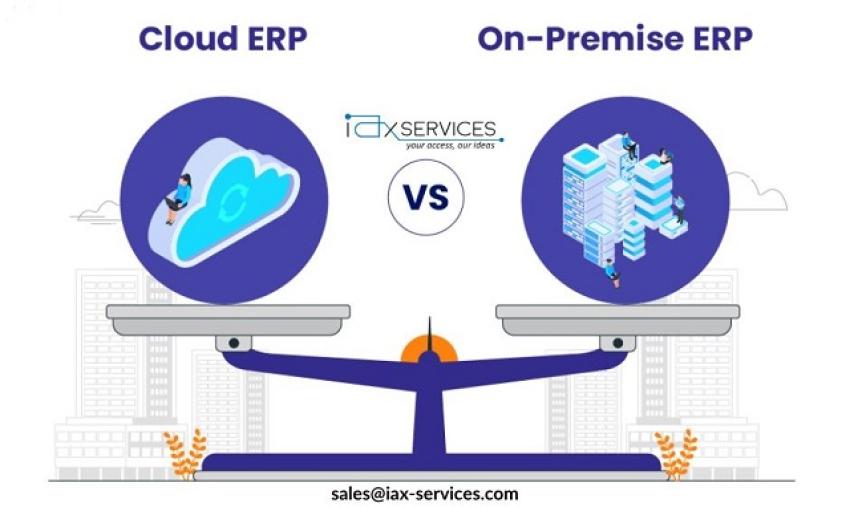
Enterprise resource planning software is a must-have for organizations, without which they will fall behind in operational performance. The ERP solution is a game-changer when it comes to uniting business processes and data, streamlining operations, and driving growth.
While that holds true, there are many aspects to consider when the decision to use an ERP solution is finalized within a business.
Choosing the ERP deployment option is a matter to consider because businesses goals are directly associated with the ERP deployment options. Only then organizations can easily achieve what they had envisioned.
Interestingly, a comparison between Cloud ERP vs. on-premises ERP would be beneficial, as these terms are directly linked to how ERP is being deployed – either on-premises or in the cloud.
- On-premise ERP deployment refers to the process of installing and managing ERP software on a company’s own servers and infrastructure.
- Cloud deployment means hosting and accessing the ERP software from the vendor’s cloud platform via the internet rather than accessing from company’s on-site servers.
Another ERP deployment option is hybrid, where organizations keep critical functions and data on-premises while utilizing cloud solutions for flexibility and scalability.
The question leads to an important question: do business decide on the right deployment for long-term-growth? Before exploring this further, it makes sense to have a deeper understanding of both ERP deployment options.
Cloud ERP vs. On-premise ERP
When you decide to use business ERP software, selecting the right deployment option can be confusing. Getting insights into the pros and cons of both the deployment options helps you make an informed decision and reach a consensus.
On-Premise ERP
As the name suggests, on-premise ERP is installed on your own servers, physically located within your office premises. In this hosting model, you are responsible for all the aspects of the ERP system, including installation, system updates, data security, and maintenance.
Cloud ERP
Cloud ERP is hosted on the service provider’s cloud infrastructure and works on a subscription-based model. You have to make recurring payment for access to the ERP software and services. The subscription-based model eliminates the need for maintaining servers.
Here, we explore various factors that plays a decisive role in selecting the most suitable solution
Cost of ownership
On-Premise ERP: On-premises ERP requires a significant upfront cost for hardware, licensing, IT infrastructure. Additionally, you must account for ongoing linked to maintenance, system upgrades, and security.
Cloud ERP: Cloud ERP is hosted on the service provider’s cloud infrastructure and operates on a subscription-based model. You have to make recurring payment for access to the ERP software and services. The subscription-based model eliminates the need for maintaining servers.
Scalability and flexibility
On-Premise ERP: On-premises ERP is not scalable by nature and requires additional investment in hardware to adapt to the growing business, which can be both costly and time consuming.
Cloud ERP: Cloud ERP is scalable in nature. It grows along with your business. It offers customization capabilities making it flexible enough to meet growing market and customer demands.
Data Security and compliance
On-Premise ERP: As data resides in your premises, you have full control over security and can meet compliance requirements. However, it also means that you are responsible for implementing security measures to protect both business and customer data.
Cloud ERP: Cloud providers often provides advanced security measures to safeguard customer data. Moreover, it also helps organizations meet regulatory compliance by adhering to industry laws and implementing data security measures.
Implementation and reliability
On-Premise ERP: The ERP implementation can be lengthy and time-consuming due to hardware set up, customization, and your business. You are also responsible for system maintenance.
Cloud ERP: Usually takes less time for implementation and the process is too simple. You do not have to worry about the maintenance and other aspects like updates, as these are handled by the ERP service provider.
Performance and reliability
On-premises ERP: As the ERP is hosted on your own servers, its performance depends on how well your server handle workloads. A robust set up can ensure high-quality performance, but hardware failures or downtime due to cyberthreats or external factors can cost you much.
Cloud ERP: Cloud ERP resides on the cloud infrastructure and it is supported by high-end systems, data disaster recovery mechanisms and security mechanisms. However, disruption can cause due to internet issues in regions with unstable networks.
Customization and integration
On-premise ERP: The ERP can be fully customized to meet specific business needs. However, broad customization can be costly and may require complex updates.
Cloud ERP: Provides customization options through custom development, API integration, and low-code or no-code tools. Cloud-based ERP systems like Microsoft Dynamics 365 provides seamless customization options while ensuring integration with existing systems and Microsoft technologies.
Ensure long-term growth with the right business ERP software
With the comparison between cloud ERP Vs on-premise ERP, you can determine which ERP deployment option best fits your business for long-term growth.
For long-term growth, a cloud ERP is ideal due to its cloud-based architecture, scalable and flexible nature, ability to adapt to the changing market environments, and the technologies like AI, automation, and analytics.
When considering cloud ERP for business growth, Microsoft Dynamics 365 stands out. The Dynamics 365 suite consists of two ERP options, including Dynamics 365 Business Central and Dynamics 365 Finance and Operations, both are designed for businesses of all sizes and types.
You can choose the right business ERP software with the support and guidance of experienced and reliable Microsoft ERP partners




